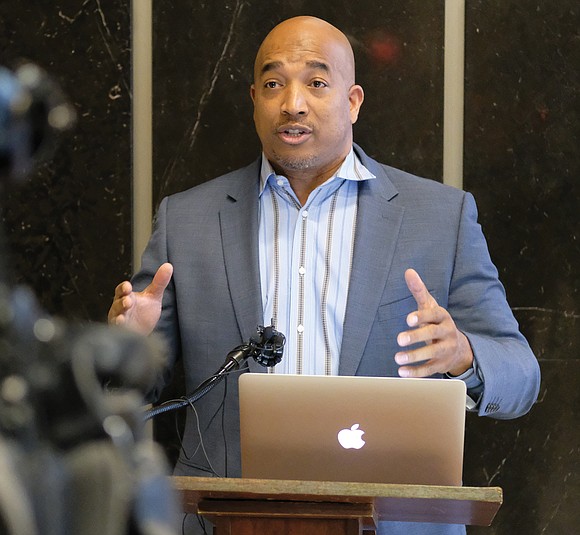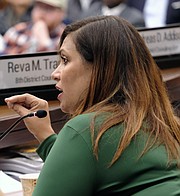City Council readies for lower revenue projections
Jeremy M. Lazarus | 4/9/2020, 6 p.m.
Ninth District Councilman Michael J. Jones, chair of City Council’s Finance and Economic Development Committee, estimates that projected Richmond revenues in the new fiscal year that will begin July 1 could shrink by $75 million to $100 million as a result of the coronavirus.
Councilwoman Ellen F. Robertson, 6th District, one of the longest serving council members, said city budget analysts are running scenarios of potential losses from 10 percent to 30 percent in revenue.
But so far, council members remain as much in the dark as the general public, said Councilwoman Kim B. Gray, 2nd District.
Hopes are high that next week, council members as well as city residents can get a first glimpse of the projected impact the virus is having now and could have on the coming fiscal year. That could happen Monday, April 13, when City Council is scheduled to hold its first session to review the $1.92 billion city budget plan for 2020- 21 submitted by Mayor Levar M. Stoney on March 6.
Ms. Gray, meanwhile, issued a letter calling on Mayor Stoney to provide revised revenue estimates both for the current 2019-2020 fiscal year and for the 2020-21 fiscal year — based on prospects that Richmond, like other communities, is heading into a virus-driven recession that could create shortfalls in city revenue.
So far, Mayor Stoney and his top financial advisers and staff have offered little guidance in the face of uncertainty on how long the pandemic lockdown will continue and whether there will be an extended recession.
There also is uncertainty about the amount of money the city might receive from the $1.5 billion in support the federal government will be sending to the state government to distribute to local governments to shore up their finances.
“Sure, we will have more to say and more info and numbers in the coming days and weeks,” Jim Nolan, Mayor Stoney’s press secretary wrote on March 27 in response to a Free Press query.
“The disruption caused by this pandemic is going to have a significant negative impact on budgeted revenues and projections, not only in Richmond but across the region, commonwealth, nation and world.
“City Finance and Budget staffs are currently reviewing and analyzing both the revenue and expenditure forecasts for the current and upcoming fiscal years and will provide revised projections as they become available. The long-term fiscal impact, of course, will be determined by how long the pandemic is expected to last,” he noted.
Already the state is taking steps to deal with estimates that state revenue could fall by $1 billion in each of the next two years.
In the past week, Gov. Ralph S. Northam has imposed a hiring freeze to prevent state agencies from filling positions not designated as essential and ordered state agencies to “eliminate discretionary spending, avoid new spending commitments and prepare for budget cuts in the next two years.”
Like the governor, Mayor Stoney has protected city employees and rejected layoffs or furloughs at this point.
Unlike Chesterfield County, which recently furloughed 500 employees without pay as a cost-cutting measure, City Hall is still providing full pay to everyone on its payroll as is the school system and other arms of city government.
No cutbacks have been announced in city spending, although that could be happening internally.
Before the coronavirus upheaval, City Hall was reporting one of its best financial years and offering an early projection of a $5.3 million surplus, in large measure because of the continuing surge in property values.
The general fund, the biggest element of the budget, was projected to end the current year with $761.9 million collected, and up nearly $16 million from the adopted general fund budget. And the growth had been ex- pected to continue in the upcoming fiscal year, with Mayor Stoney projecting revenues for fiscal 2020-21 at $782 million.
But since mid-March, when Gov. Northam declared a state of emergency, the whole picture has changed. A substantial portion of the more than 800 city restaurants has shut down, while others are trying to weather the slump in patrons with takeout and delivery orders.
The bottom line: An almost certain reduction in the April, May and June collections of meals taxes and continued reductions even in a recovery.
The city also will see lower lodging tax collections from hotels and motels that are seeing far fewer guests during the pandemic.
The impact also is projected to hit revenue from real estate taxes and personal property taxes on cars. Councilwoman Reva M. Trammell, 8th District, is proposing the city grant amnesty on penalties and interest for late payment, which would eliminate millions of dollars in anticipated city income.
That amnesty to benefit property owners would mirror a proposal Mayor Stoney has
advanced and which is to be approved by City Council on Monday to provide relief from penalties and interest to businesses that collect meals, lodging and amusement taxes late.
Currently, assessments of real estate are underway for fiscal 2020-21. City Assessor Riche McKeithen has not publicly issued updated projections based on the virus’ impact, but council members are anticipating that real estate values, particularly for apartments, retail and other commercial property, could take a significant hit.
Behind the scenes, some are projecting that Richmond real estate values might fall from a projected 8 percent to 11 percent increase in assessments to a 1.5 percent increase, sheering millions from the mayor’s budget projections.
Paul Goldman, an attorney and political strategist who is considering a run for mayor, has urged Mayor Stoney to dip into the city’s reserves and create a $50 million fund to ensure the needs are met of “first responders and those working in vital supply chains for services and goods.”
In Mr. Goldman’s view, the virus is “exposing the fiscal irresponsibility of Mayor Stoney and his predecessor, Dr. Dwight C. Jones, and City Council in enacting bloated budgets larded with wasteful and unnecessary expenditures, adding up to a very costly government apparatus the people can’t afford.”
In the face of a coming recession, Mr. Goldman said now is the time to change that situation, and he urged the mayor and the council to immediately institute significant cuts to payroll and expenses “to share the sacrifice of city residents who, on average” are greatly suffering job and income losses.
He also urged Mayor Stoney and the council to terminate proposed increases in utility rates and fees slated for July 1 in order to provide relief to customers.










